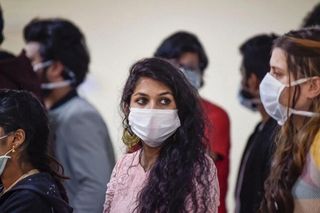
How Likely Are You to Get Coronavirus? Very.
Good news, though: for most people, it’s no worse than the flu.

How likely is it to get coronavirus? Very, experts say, even if you’re not in one of the outbreak countries.
COVID-19, the strain of coronavirus behind the growing outbreak, is unique in its level of contagion. By Friday, the virus had infected more than 83,000 people in at least 53 countries in a span of roughly two months. And while no one is calling the spread of coronavirus a pandemic yet, the World Health Organization on Friday acknowledged the infection as having “pandemic potential.” According to experts around the world, it’s likely to realize that potential in the near future.
“It doesn’t look like this virus is ever going to go back in its box,” Ian Mackay, an esteemed Australian immunologist and professor at Monash University, told The Daily Telegraph. “And so we’re likely to have the virus become what we call an endemic virus, or a virus that’s just with us for life.
“I think the likely outcome is that it [COVID-19] will ultimately not be containable,” epidemiology professor Marc Lipsitch, of Harvard University, told The Atlantic.
It’s not all doom and gloom, however. The reason we’re all likely to get coronavirus is that COVID-19 most frequently manifests in mild cases, not so different from the common cold, or moderate cases, more similar to the flu. And experts suspect that, as in roughly 14% of flu cases, some people with coronavirus may not have any symptoms at all — thus spreading the disease far and wide through casual, incautious contact despite one of the most immediate and efficient global efforts at containment. For example, two weeks ago 14 Americans evacuated from the Diamond Princess, a cruise ship ravaged by coronavirus and quarantined in Japan, tested positive for COVID-19, despite feeling healthy.
Related on The Swaddle:
Paracetamol 40% More Expensive After Coronavirus Causes Shutdown in China
Within the next year, as much as 40% to 70% of the world’s population is likely to be infected, according to Lipsitch’s estimates — but “it’s likely that many will have mild disease, or may be asymptomatic,” he told The Atlantic. For the former cases, it’s likely symptoms will be “self-limiting,” Dr. Jin Dongyan, a virologist at the University of Hong Kong, told the New York Times, meaning the cough, shortness of breath, and fever will resolve on their own with rest and hydration, similar to flu symptoms.
More than 80% of confirmed coronavirus cases are not severe, according to the largest study of the Chinese outbreak to date, conducted by the Chinese Centers for Disease Control and Prevention. And those that are severe aren’t always deadly. While much has been made of death tolls in the media, the fatality rate of coronavirus is fairly low. According to the study, 2.3% of people diagnosed with coronavirus in China have died, but the researchers suggest this is an inflated fatality rate, due to an unusually high proportion of deaths within the focal province, whose health system has been overwhelmed and is unable to provide adequate care. Outside of that province, the fatality rate of coronavirus is 0.4% — closer to the fatality rate of the common flu (0.1%) — and may be much lower, as calculations can’t take into account people who are asymptomatic and go undiagnosed.
While it’s possible that COVID-19, like its relative SARS, could slow in its spread as it becomes less and less contagious, Dr. Jin said, experts agree the more expected outcome is that it’s very likely that you’ll get coronavirus at some point in the near future. For most people, it will mean a few days under the weather, at home, feeling miserable. For some, it may mean a hospital stay. For the old and infirm — as with the flu — the risk of a severe case and death is highest. Eventually, however, it’s likely a shot or oral medication will be developed to prevent or mitigate infection, similar to the now-standard annual flu shot and drugs like Tamiflu. Researchers around the world are already actively working toward developing a vaccine.
Until they achieve it, however, strap in and double down on the vitamin C, handwashing (properly), and Crocin — Corona Season is coming.
Liesl Goecker is The Swaddle's managing editor.
Related


Histrionic Personality Disorder Can Cause an Overwhelming Need for Attention
